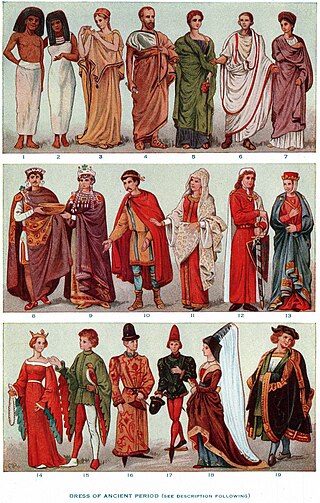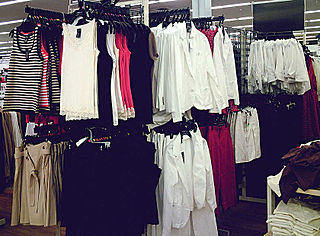
Clothing is any item worn on the body. Typically, clothing is made of fabrics or textiles, but over time it has included garments made from animal skin and other thin sheets of materials and natural products found in the environment, put together. The wearing of clothing is mostly restricted to human beings and is a feature of all human societies. The amount and type of clothing worn depends on gender, body type, social factors, and geographic considerations. Garments cover the body, footwear covers the feet, gloves cover the hands, while hats and headgear cover the head, and underwear covers the private parts.

Disability is the experience of any condition that makes it more difficult for a person to do certain activities or have equitable access within a given society. Disabilities may be cognitive, developmental, intellectual, mental, physical, sensory, or a combination of multiple factors. Disabilities can be present from birth or can be acquired during a person's lifetime. Historically, disabilities have only been recognized based on a narrow set of criteria—however, disabilities are not binary and can be present in unique characteristics depending on the individual. A disability may be readily visible, or invisible in nature.

Ready-to-wear (RTW) – also called prêt-à-porter, or off-the-rack or off-the-peg in casual use – is the term for garments sold in finished condition in standardized sizes, as distinct from made-to-measure or bespoke clothing tailored to a particular person's frame. In other words, it is a piece of clothing that was mass produced in different sizes and sold that way instead of it being designed and sewn for one person. The term off-the-peg is sometimes used for items other than clothing, such as handbags. It is the opposite of haute couture.
Disability studies is an academic discipline that examines the meaning, nature, and consequences of disability. Initially, the field focused on the division between "impairment" and "disability", where impairment was an impairment of an individual's mind or body, while disability was considered a social construct. This premise gave rise to two distinct models of disability: the social and medical models of disability. In 1999 the social model was universally accepted as the model preferred by the field.

Leah Lakshmi Piepzna-Samarasinha is a Canadian-American poet, writer, educator and social activist. Their writing and performance art focuses on documenting the stories of queer and trans people of color, abuse survivors, mixed-race people and diasporic South Asians and Sri Lankans. A central concern of their work is the interconnection of systems of colonialism, abuse and violence. They are also a writer and organizer within the disability justice movement.
Ableism is discrimination and social prejudice against people with physical or mental disabilities. Ableism characterizes people as they are defined by their disabilities and it also classifies disabled people as people who are inferior to non-disabled people. On this basis, people are assigned or denied certain perceived abilities, skills, or character orientations.
Aimee Louw is a disabled activist, writer, and radio host currently living in Montreal, Quebec, Canada. She works to fight ableism and her work is informed by queer and feminist theory. She studied Political Science at Concordia University. She has presented at conferences at both McGill University and York University about her research on social movements and disability rhetoric. She works for Cinema Politica, cofounded Accessibilize Montreal, and co-hosts the radio show Native Solidarity News. She has also spoken on the radio show Talking Radically. She is the creator of the zine and tumblr Underwater City Project. She has been published in the Montreal Gazette.

Intersex people are born with sex characteristics that "do not fit the typical definitions for male or female bodies". They are substantially more likely to identify as lesbian, gay, bisexual, or transgender (LGBT) than endosex people. According to a study done in Australia of Australian citizens with intersex conditions, participants labeled 'heterosexual' as the most popular single label with the rest being scattered among various other labels. According to another study, an estimated 8.5% to 20% experiencing gender dysphoria. Although many intersex people are heterosexual and cisgender, this overlap and "shared experiences of harm arising from dominant societal sex and gender norms" has led to intersex people often being included under the LGBT umbrella, with the acronym sometimes expanded to LGBTI. Some intersex activists and organisations have criticised this inclusion as distracting from intersex-specific issues such as involuntary medical interventions.
Annie Segarra, also known as Annie Elainey, is an American YouTuber, artist, and activist for LGBT and disability rights. Segarra, who is queer, Latinx, and disabled, advocates for accessibility, body positivity, and media representation of marginalized communities.

Queer fashion is fashion among queer and nonbinary people that goes beyond common style conventions that usually associate certain colors and shapes with one of the two binary genders. Queer fashion aims to be perceived by consumers as a fashion style that focuses on experimenting garments based on people's different body shapes instead of following the restrictions given by gendered clothing categorization.
GenderFail is a publishing and programming initiative created by Be Oakley that seeks to encourage projects from an intersectional, queer perspective. Many projects are tied together by the slogan "Radical Softness as a Boundless Form of Resistance". The press is currently based out of Brooklyn, New York. In an April 16, 2020 article "Our Favorite New Yorkers on the Best Things in All Five Boroughs" in Conde Nast Traveler, curator Legacy Russell mentioned GenderFail as one of their favorite things in New York.
Sharpe Suiting is an American designer, producer and manufacturer of garments based in Los Angeles, California. The company was founded in 2013, in Los Angeles, by Leon Elias Wu, who is the current CEO of the company. Sharpe suiting is a public-benefit corporation recognized for gender neutral clothing and genderqueer fashion.
Stephanie Thomas is an American disability fashion stylist, public speaker, voice actor, and professor.
Jennifer White-Johnson is an artist and activist living in Baltimore, Maryland, US. As a disabled Afro-Latina artist with ADHD and Graves' Disease she uses graphic design and photography as a means to discuss the intersection of disability rights and anti-racism, and to give visibility to misrepresented voices. After completing her Masters degree, she taught as professor of Visual Communication Design at Bowie State University. Some of her more famous works include the Black Disabled Lives Matter symbol, and a Black Autistic Joy advocacy zine called Knox Roxs.
Raul Pizarro is a queer, disabled, latinx visual artist who known for his Day of the Dead series, as well as his paintings about his queerness and his disability.

Dykes, Disability & Stuff was a lesbian and disability magazine founded in 1988 in Boston, Massachusetts and published in Madison, Wisconsin. Its publication ended in Fall 2001.
Mira Bellwether was an American author, artist, and sex educator best known for Fucking Trans Women, a single-issue zine in which she wrote and illustrated all articles. Described in Sexuality & Culture as "a comprehensive guide to trans women's sexuality", Fucking Trans Women was the first publication of note to focus on sex with trans women and was innovative in its focus on trans women's own perspectives and its inclusion of instructions for many of the sex acts depicted. Bellwether was also an advocate for transgender women and in opposition to trans-exclusionary feminism.
Rora Blue is an American visual artist, fashion designer, and model. Their work primarily focuses on sexuality, gender, and disability. They are responsible for The Unsent Project and After the Beep. Blue's work primarily takes the form of text-based art, installations, and audience interaction. Blue's work also revolves around the importance of color. Blue has stated that their work is based on their every day experiences of being "multiply marginalized" as a person who is queer, disabled, and a gender minority.
Disability and LGBTQ identity both can play significant roles in the life of an individual. Disability and sexuality can intersect in compounding ways, and, for many people, being both disabled and LGBTQ can result in double marginizalization. The two identities, either by themselves or in tandem, can complicate questions of discrimination and access to resources like accommodations, support groups, and elder care.
The Disability Futures Fellowship Award is a grant award offered by the Ford and Mellon Foundations to promote disabled artists. Through the Fellowship, the Ford and Mellon Foundation offers fifty thousand dollars to twenty artists every 18 months, totaling one million dollars per cohort.






